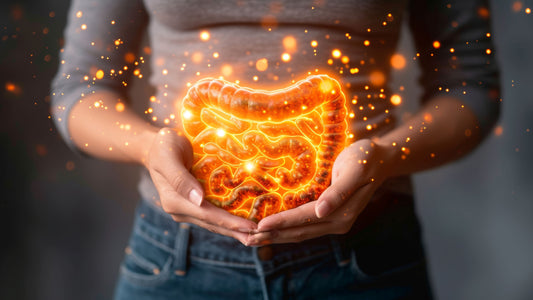In This Article, You’ll Learn
- 7 common signs of hormone imbalance (and what’s “normal” vs “not optimal”)
How to tell perimenopause from “just stress”
Gentle, practical steps to start feeling like yourself again
Cosmetic and nutrition-focused options that support comfort and daily wellness
Girlfriend, You’re Not “Losing It”—Your Body’s Asking for Support
If you’ve been waking at 3 a.m. for no reason, tearing up over coffee commercials, or walking into rooms and forgetting why—you’re not alone. I’m Dr. Anna Cabeca, your Girlfriend Doctor. As a triple‑board‑certified OB‑GYN who went through early menopause at 39, I’ve seen (and felt) it all.
These shifts are not failures. They’re signals. Your body is evolving—and asking for new support. Let’s decode what your hormones may be trying to tell you and map out simple steps you can take today.

It’s not just “sleep hygiene.” Midlife biology can change how rested you feel.
Why this can happen
Changes in progesterone (calming) and cortisol (stress) can nudge your nervous system into “tired but wired.”
What to try
Power down screens at least 60 minutes before bed; keep the room dark and cool.
Gentle wind‑down: 4‑7‑8 breathing, journaling, or a warm bath.
Daily wellness support: a greens/adaptogen blend taken earlier in the day can be part of a steady‑energy routine (always follow label directions).
Morning light exposure + a short walk help anchor your circadian rhythm.

You’re not “too sensitive.” You’re human—and hormones influence neurotransmitters like serotonin and GABA.
Why this can happen
Estrogen patterns shift through perimenopause; that can influence your emotional thermostat.
Blood‑sugar dips and poor sleep amplify irritability.
What to try
Track your mood for 2–4 weeks to see patterns.
Move your body daily (even 10 minutes).
Nourish early: protein‑forward breakfast to stabilize energy and mood.
Cosmetic note: Some women choose a cosmetic skin cream that includes progesterone/pregnenolone for external use on thin‑skinned areas; discuss questions with your provider.

You love your partner. But dryness, fatigue, and “meh” feelings can make intimacy feel like work.
Why this can happen
With time, vulvar skin can feel drier and less elastic; stress and sleep also affect desire and connection.
What to try
External skin hydration:
Julva (a cosmetic feminine cream that includes DHEA for cosmetic use) supports the appearance and feel of hydrated, comfortable external skin.
Prefer hormone‑free? Choose Velvè, a gentle cosmetic moisturizer for delicate skin.
Oxytocin rituals: cuddling, hand‑holding, long hugs, slow dancing, eye contact.
Communicate desires and boundaries—safety and trust are powerful “sparks.”
Cosmetic note: Topicals mentioned are cosmetics intended for external use to improve the appearance and feel of skin.

Welcome to “walked into the room and forgot why” lane. You’re not alone.
Why this can happen
Hormone shifts can influence cerebral blood flow and neurotransmitter signaling.
Sleep and stress are major fog amplifiers.
What to try
Eat omega‑3s (salmon, sardines, chia, flax) and choline‑rich foods (eggs).
Mindfulness and breathwork lower stress reactivity.
Keep a steady rhythm: protein + plants at meals, consistent wake/sleep, morning light exposure.
Consider a daily greens/adaptogen blend for general wellness support as part of a broader routine.

You’re eating “cleaner” than ever, yet your belly says otherwise. It’s not a moral failing. It’s physiology.
Why this can happen
Estrogen patterns change fat distribution, while high stress can push fat storage centrally.
Less muscle mass = less metabolic “oomph.”
What to try
Strength train 2–3x/week (compound moves: squats, hinges, rows, presses).
Walk after meals (even 10 minutes helps).
Build plates around protein + non‑starchy veggies + healthy fats.
Keep a balanced, protein‑forward shake on hand for busy mornings.

“Juicy” is energy, presence, sensuality—your spark.
Why this can happen
Stress, sleep debt, and disconnection can dull your glow; skin can also feel thinner and drier with time.
What to try
Pleasure rituals: mirror work, a sunset walk, music you can’t not move to.
Daily moisturizing for face/body—and, yes, for vulvar skin (cosmetic moisturizers like Julva or hormone‑free Velvè for external comfort).
Stack small wins: 10‑minute walk + protein‑forward breakfast + screen‑free wind‑down. Consistency beats intensity.

No. Aging is inevitable; suffering is not. When we normalize discomfort, we miss opportunities to support ourselves.
What to try
Start with a quiz or checklist to clarify your top 1–2 goals.
Optimize the “big 3”: sleep, strength, and simple plates (protein + plants).
Reduce “background noise”: clean water, clean air, gentle personal care products.
Perimenopause vs “Just Stress”: What’s the Difference?
Both can look similar—irritability, fog, sleep changes—but perimenopause often includes cycle changes (shorter/longer, heavier/lighter) and vulvar/vaginal dryness. Track your cycle, sleep, mood, and energy for 1–2 months; patterns reveal a lot.
A Gentle Game Plan You Can Start Today
Morning
Hydrate with mineralized water; get 5–10 minutes of morning light.
Protein‑forward breakfast or balanced shake.
5 deep breaths before you open your inbox.
Midday
10–20 minute walk (bonus: after lunch).
Colorful, protein‑rich lunch; keep snacks simple (protein + produce).
Afternoon
Hydrate again; short stretch break.
If needed, a small, balanced snack to steady energy.
Evening
Protein + plants dinner; starchy carbs if they help you sleep.
Screens off or filter blue light; journaling or reading to wind down.
Consistent bedtime; dark, cool room.
Consistency creates capacity. Start where you are, layer slowly, and celebrate the small wins.
Safety & Sensitivity Notes (Read This First)
Topical cosmetics: for external use only to improve the appearance and feel of skin. Patch test if you’re sensitive.
Julva contains DHEA for cosmetic use. Avoid if you are on tamoxifen. Consult your provider if you are pregnant, breastfeeding, have hormone‑sensitive conditions, or an active vaginal infection.
Cosmetic creams that include progesterone/pregnenolone are for external cosmetic use on skin; consult your provider if you use prescription hormones.
Dietary supplements support general wellness and are not intended to diagnose, treat, cure, or prevent any disease. Consult your provider if you take medications or manage medical conditions.

Is it perimenopause or just stress?
They overlap. Perimenopause often includes cycle changes and vulvar/vaginal dryness along with mood/sleep shifts. Track symptoms for patterns.
Can I still get pregnant during perimenopause?
Yes. If you’re still menstruating—even irregularly—pregnancy is possible.
Is there a test for hormone imbalance?
Labs can help, but symptoms plus cycle tracking often guide next steps. Start with a simple checklist and discuss with your provider.
What’s the difference between HRT and products like Julva?
HRT involves prescription hormones. Julva is a cosmetic product for external use, formulated to improve the appearance and feel of delicate skin.
What can help if intimacy feels uncomfortable?
Use a cosmetic moisturizer for external skin (Julva or hormone‑free Velvè), go slowly, communicate, and focus on oxytocin rituals (touch, talk, eye contact).
How do I start gently if I’m sensitive?
Topicals: patch test 24–48 hours; begin every other day.
Supplements: start with half serving; take with food and water.
Introduce only one new item every 3–5 days.
You’re not broken—you’re shifting. Your body is communicating. When you meet it with compassion, protein‑rich plates, daily movement, better sleep, and thoughtful skin care, you reclaim clarity, comfort, and confidence. Start with one small step today. The results stack.
Disclaimers
Cosmetic products mentioned are for external use to improve the appearance and feel of skin and are not intended to treat medical conditions.
Dietary supplements support general wellness and are not intended to diagnose, treat, cure, or prevent any disease.
This article is educational and does not replace personalized medical advice. Always consult your healthcare provider with questions about your health or medications.



